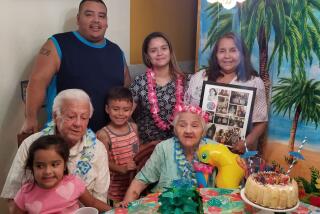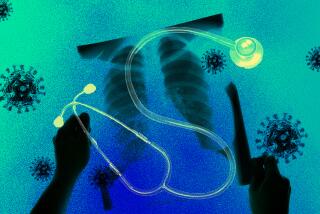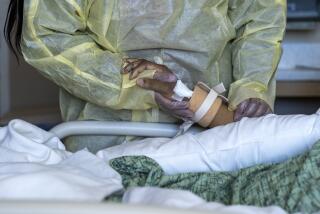Pushing 100, married couple survive COVID-19
- Share via
SAN DIEGO — Rachel Smith, a physician with the Centers for Disease Control and Prevention in Atlanta, knew the prognosis was not promising when she learned her grandparents in San Diego had contracted COVID-19 last month.
“I told my grandfather when he went into the hospital that if he recovered, I’d tell everybody about it,” she said.
That was Nov. 30. Today, she’s thrilled that she was able to make good on her promise.
Her grandparents appear to have beaten the odds, and both are back home and well after recovering from a virus that has claimed almost 1.6 million lives worldwide and has been especially lethal for older people.
Norman Mann will be 99 in March. Sivia Mann, his wife of 76 years, is 96. They have lived in San Diego since 1953, currently at the senior community Vi in La Jolla.
Smith, who lives in Atlanta, said her grandparents might have contracted COVID-19 from a caretaker. She knew immediately that their lives were in danger because of their advanced age.
In San Diego County, more than 1,100 people have died of the virus this year, and almost half were 80 or older.
The family was prepared for the worst, especially for Norman, who was briefly hospitalized.
“We were all worried he was going to die,” Smith said.
But the effects of COVID-19 have been hard to predict. Some people exposed to the virus may get it, and others may not. It can be fatal or send some people to the hospital, while others who test positive may not even have symptoms.
In the case of the Manns, Smith said her grandmother believed she only had a cold, while her grandfather developed a nasty cough soon after his diagnosis and had to be hospitalized and placed on oxygen.
Smith’s mother, Stacy Mann, daughter of Norman and Sivia, said she was wearing a mask and sitting on her father’s bed and talking to him shortly before she learned that they had been exposed to someone who tested positive.
“As soon as I found out they had been exposed to COVID, I thought, ‘I have to go now,’ ” she said. “I’m 71 and I don’t want COVID either.”
She tested negative, but she had grave concerns for her father, who has Parkinson’s disease and other health issues.
“It’s scary because it’s a fickle disease and you don’t know who it’s going to affect and who it’s not going to affect,” she said.
Norman Mann was placed in the COVID-19 ward at Vi and later hospitalized, but he never felt too ill. He asked for bean burritos, rice and French fries while in the COVID-19 ward, and came home from the hospital Dec. 2 after a couple of days.
“We were all worried he was going to die,” Smith said. “And he came home in a couple of days. Our whole family was trying to figure out what we’d do if he passed away.”
“We were thinking, this is probably it,” Stacy Mann said, adding that the family was discussing whether they should agree to put him on a ventilator if his condition worsened.
Norman and Sivia were not available to be interviewed, but Stacy said she had a conversation over the phone with her dad Friday.
“I asked him how he felt when he found out he had COVID-19,” she wrote in an email. “He said he wasn’t really sure that that is what he had. He didn’t realize that it was a deadly virus and thought perhaps it was a different virus.
“He was surprised when I explained to him that it was deadly, as he was feeling pretty much normal for him,” she wrote.
While her father said he never felt too bad while he had the disease, she wrote that he did feel pretty bad being briefly separated from his wife of 76 years.
Warth writes for the San Diego Union-Tribune.
More to Read
Sign up for Essential California
The most important California stories and recommendations in your inbox every morning.
You may occasionally receive promotional content from the Los Angeles Times.














